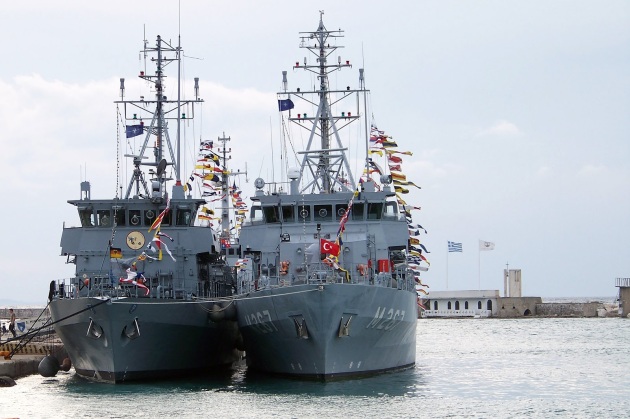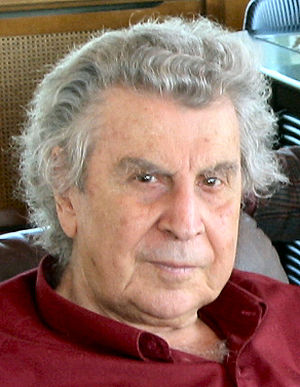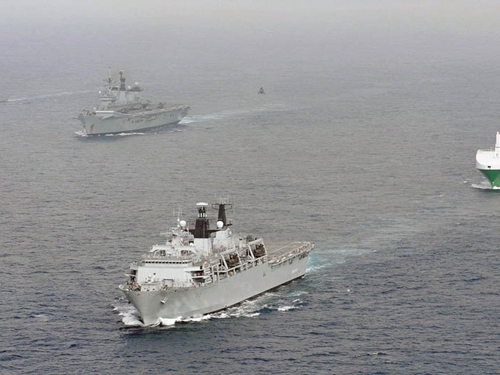“Serbia will fulfill conditions, won’t recognize Kosovo”
Source: Tanjug
ATHENS -- Serbian President Tomislav Nikolić has
said that Serbia will fulfill all EU conditions but that it would never
recognize Kosovo’s independence.
Tomislav Nikolić in Athens on Friday (Tanjug)
The president started his visit to Greece on Friday morning with a meeting with his Greek counterpart Karolos Papoulias.
Papoulias
told reporters that geopolitical situation in the region was sensitive
and that Greece and Serbia were therefore obligated to show solidarity
when it comes to critical national issues as countries with historical
friendly ties.
Nikolić said that protection of Serbia’s
sovereignty was a national interest. Nikolić thanked Papoulias on his
country’s support to preservation of Serbia’s territorial integrity and
EU pathway and said that Athens could count on Belgrade’s help.
“Serbia will help Greece if it wants to solve some of its problems. We
have friendship, reputation and trust so we can help people, that are in
fact not fighting, reconcile,” the Serbian president said.
His
Greek counterpart conveyed Athens’ official position regarding Cyprus
and a name dispute with the neighboring Macedonia. He stressed that
Greece supported Serbia’s EU integration and that its main policy was to
preserve stability and peace in the Balkans.
“We support EU
accession of all Western Balkan countries in order to achieve this
common European goal and consolidate stability in Serbia,” Papoulias
pointed out.
The two presidents noted that Greece and Serbia
had no open issues but only friendship that “will never stop”. They said
ahead of the meeting that nothing could ever separate the Serbian and
Greek people because their ties had been built by their ancestors.
Nikolić and Papoulias also assessed that the two countries’ economic
cooperation was also good and that a great number of Greek companies did
business in Serbia.
After the meeting, delegations of the two
countries held a meeting, which was attended by Nikolić, Foreign
Minister Ivan Mrkić, Culture Minister Bratislav Petković, president’s
foreign policy advisor Marko Đurić and Serbia’s Ambassador to Greece
Dragan Županjevac.
During his three-day visit, the Serbian
president will meet with Greek parliament Speaker Vangelis Meimarakis,
PM Antonis Samaras and representatives of top political parties.
In Athens, Nikolić laid a wreath to the Unknown Soldier Tomb with Greek
Defense Minister Panos Panayotopulos and he will attend a session of
the Serbo-Greek business council with Greek Development Minister Kostas
Hatzidakis on Friday.
Nikolić will visit the crypt at
Zeytinlik, the Serbian military cemetery near Thessaloniki, where he
will lay wreaths, as well as the islands of Corfu and Vido, in
commemoration of Armistice Day on Saturday.
The Serbian
president and his Greek counterpart will attend a commemorative ceremony
on the island of Vido, after which they will visit the Serbian Museum
of Corfu, dedicated to Serbian Kingdom's soldiers who perished there
during the First World War.
He will also visit Mount Athos and the Serbian Orthodox monastery of Hilandar.
No change on Kosovo
Greek
Parliament Speaker Vangelis Meimarakis underlined during the talks with
Serbian President Tomislav Nikolić on Friday that the Greek stance on
Kosovo's independence will not change.
Greece is one of the
five EU member-stated that have not recognized the ethnic Albanian
unilateral declaration, made in early 2008.
Meimarakis
expressed Greece's clear support to Serbia's EU pathway, stressing that
it is of crucial importance for the Balkan region to be stable and
secure.
The Serbian president said that Serbia highly
appreciates Greece's support in terms of its European integration
process and territorial integrity.
Serbia will fulfill all EU
membership conditions, which were fulfilled by other EU members as well,
Nikolić said, stressing that Serbia highly values the support of all
five EU members, Greece included, which do not recognize Kosovo's
unilateral declaration of independence.



 Ο
πρωθυπουργός της Αλβανίας, Σαλί Μπερίσα, βρισκόμενος στο Κάμεζ
εγκαινίασε αρκετές εγκαταστάσεις και εργαστήρια του τμήματος
βιοτεχνολογίας και τροφίμων του Γεωπονικού Πανεπιστημίου. Με την
ευκαιρία αυτή, μίλησε για την αλβανική εθνότητα, έχοντας επίγνωση των
επιπτώσεων του εθνικιστικού πνεύματος από κόμματα στις επερχόμενες
εκλογές.
Ο
πρωθυπουργός της Αλβανίας, Σαλί Μπερίσα, βρισκόμενος στο Κάμεζ
εγκαινίασε αρκετές εγκαταστάσεις και εργαστήρια του τμήματος
βιοτεχνολογίας και τροφίμων του Γεωπονικού Πανεπιστημίου. Με την
ευκαιρία αυτή, μίλησε για την αλβανική εθνότητα, έχοντας επίγνωση των
επιπτώσεων του εθνικιστικού πνεύματος από κόμματα στις επερχόμενες
εκλογές.























